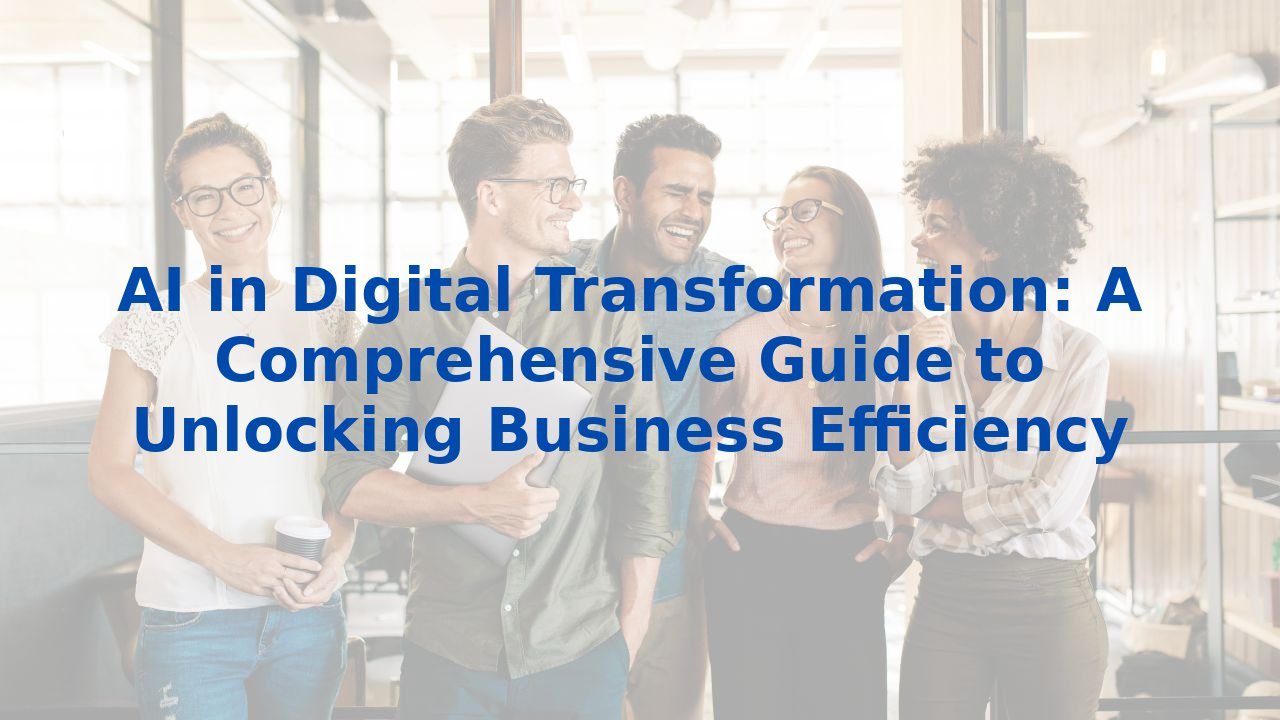AI in Digital Transformation: A Comprehensive Guide to Unlocking Business Efficiency
The Power of AI in Digital Transformation: Enhancing Business Processes and Efficiency
In today's fast-paced business environment, digital transformation has become a critical necessity for organizations striving to stay competitive. Outdated technology and rapid growth are common hurdles that can stifle operational efficiency. This is where Artificial Intelligence (AI) steps in, acting as a transformative force that streamlines business processes and boosts overall efficiency. In this guide, we will explore how AI revolutionizes digital transformation and the myriad benefits it brings to an organization.
Understanding the Need for Digital Transformation
Many organizations grapple with issues stemming from outdated technology, which can manifest in the form of paper-based processes or disconnected systems. Such inefficiencies can be detrimental, preventing growth and hampering productivity. Simultaneously, businesses that experience rapid growth often find themselves overwhelmed by their escalating IT demands. Both scenarios underline the pressing need for a well-structured digital transformation strategy.
The Role of AI in Digital Transformation
AI emerges as a powerful enabler of digital transformation, offering an array of advantages that can completely change business operations. Here’s a closer look at how AI enhances various aspects of digital transformation:
1. Automation and Efficiency
AI excels at automating repetitive, time-consuming tasks. This allows human resources to pivot towards more strategic and creative responsibilities. Routine processes like data entry, customer inquiries, and administrative tasks can be efficiently managed by AI-driven bots, thereby relieving employees from mundane workloads while also minimizing human error.
2. Data Analysis and Insights
The sheer volume of data generated today can be overwhelming. AI’s capacity for processing and analyzing vast datasets is unparalleled, enabling organizations to discern patterns and insights that may otherwise go unnoticed. This data-centric approach empowers businesses to make informed decisions, optimize operations, and explore new growth avenues. With AI at play, real-time data analysis becomes a game-changer for strategic decision-making.
3. Customer Experience and Personalization
In an era of super-connected consumers, delivering an exceptional customer experience is paramount. AI plays a pivotal role in this domain through personalized interactions. By analyzing user data, AI can curate tailored products and services, which significantly enhance customer satisfaction and loyalty. Leveraging AI-driven marketing solutions, businesses can craft personalized customer journeys, ultimately creating delightful and engaging experiences.
4. Predictive Analytics and Strategic Planning
Real-time decision-making is critical in today’s fast-paced market. AI-driven analytics enable organizations to forecast trends and assess risks. By evaluating historical data, AI systems uncover critical insights, bolstering strategic planning efforts. This not only paves the way for data-informed decision-making but also helps align business strategies with market realities.
Benefits of AI Integration
The journey towards AI integration can yield significant payoffs in operational efficiency:
- Improved Efficiency: Automation of routine tasks reduces human error and conserves time, resulting in decreased operational costs.
- Enhanced Decision-Making: AI delivers actionable insights from vast data pools, fostering swift and accurate decision-making.
- Increased Productivity: By delegating mundane tasks to AI, employees are free to engage in complex, creative endeavors, leading to heightened productivity.
- Innovation and Adaptability: AI ignites innovation by revealing insight into unexplored markets, enabling organizations to remain agile in a rapidly evolving space.
The Importance of Employee Training
While AI stands as a robust tool for enhancing business processes, training employees on how to effectively collaborate with AI technologies is pivotal. Here’s why investing in employee training should be a top priority:
- Understanding AI Capabilities: Employees must comprehend both the strengths and limitations of AI to merge it seamlessly into their workflows.
- Operational Efficiency: Well-trained staff can better deploy AI capabilities, ensuring that automation is leveraged effectively.
- Data Interpretation: Empowering employees to interpret AI-generated insights ensures that data-driven decisions align with broader business strategies.
- Adaptability: Training fosters adaptability, equipping teams to thrive in a technology-driven environment, keeping organizations poised for competition.
Conclusion
AI serves as a cornerstone for driving digital transformation, significantly improving processes through automation, insights, and personalized experiences. Integrating AI enables businesses to enhance operational efficiency while positioning themselves for future success. However, to fully leverage these advantages, investing in employee training remains paramount. As organizations navigate their digital evolution, embracing AI as a central component of their strategy will be essential for sustained growth and competitiveness.
To explore training options for your team, consider checking out resources available for equipping your entire workforce with AI skills. The future is bright for organizations that harness the potential of AI while ensuring their teams are ready to embrace the change.



